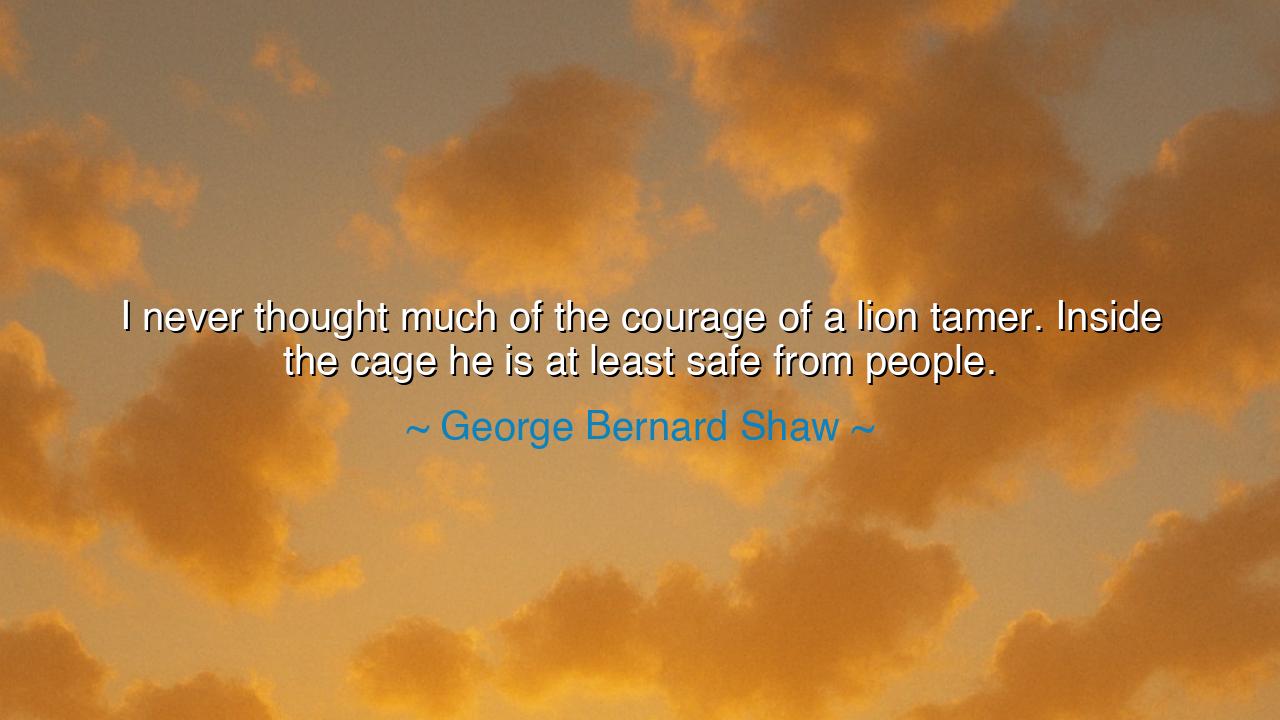
I never thought much of the courage of a lion tamer. Inside the
I never thought much of the courage of a lion tamer. Inside the cage he is at least safe from people.






“I never thought much of the courage of a lion tamer. Inside the cage he is at least safe from people.” — Thus spoke George Bernard Shaw, the fierce wit and philosopher of human nature, whose pen cut sharper than any sword. Beneath the humor of his words lies a profound and unsettling truth: that the greatest trials, the deepest dangers, and the truest tests of courage do not come from beasts or nature, but from human beings themselves. The lion, fierce and noble, strikes without deceit; but man, armed with envy, greed, and hypocrisy, wounds in silence, smiles while he betrays, and cloaks cruelty in civility. To be among lions is to face an honest threat. To be among men is to face a thousand invisible ones.
The origin of Shaw’s reflection springs from his lifelong observation of society — its hypocrisies, its vanities, and the fragile masks men wear. In his plays and essays, he dissected the human spirit with ruthless precision. He saw that men feared beasts less than they feared truth; that they would face claws and fangs before facing their own conscience or the judgment of their peers. Thus, in this quote, Shaw overturns the traditional image of bravery. The lion tamer, admired by crowds as a symbol of fearlessness, becomes in Shaw’s eyes a man who has chosen the safer battle. The real arena — the one that demands the greater courage — is not the circus cage, but the world outside it, where one must confront not beasts, but the cruelty, judgment, and misunderstanding of mankind.
It is an ancient irony: the beasts of the earth kill to survive, but men destroy out of pride, suspicion, or the hunger for power. To stand against an animal’s rage is a test of strength, but to stand against the malice of society is a test of soul. The claws of a lion may rend the flesh, yet they cannot touch the spirit. But the words of men — their lies, their mockery, their betrayal — can pierce the heart and poison the mind. Thus, Shaw’s insight reaches into the timeless struggle of those who live by truth in a world that prefers illusion. The bravest souls are not those who subdue wild beasts, but those who dare to live authentically amidst the judgments of others.
Consider the life of Socrates, who faced not lions but the more terrible beasts of ignorance and fear. His courage was not physical, but moral — the courage to speak truth in a city that would rather not hear it. Surrounded not by fangs but by accusations, he stood unflinching before the court of Athens, choosing death rather than betrayal of his own conscience. The lion tamer risks his body for applause; Socrates risked his life for integrity. And though the poison cup ended his days, his spirit triumphed — for the courage of one honest man outlasts the roar of a thousand mobs.
Shaw’s words also expose the deeper loneliness of the one who sees through illusion. To step outside the comfort of conformity is to enter a cage of another kind — the cage of isolation. But in that solitude, there is a strange safety, the kind Shaw hints at with irony. For inside the lion’s cage, the tamer is shielded from society’s deceit; the lions are honest adversaries. They do not flatter, they do not lie. Their nature is pure, even in its savagery. It is among people — with their subtle cruelties and shifting loyalties — that the spirit must truly defend itself. Thus, Shaw teaches that moral courage is rarer, and more perilous, than physical bravery.
In a world where many hide behind masks, where truth is bartered for comfort, it takes immense courage to live sincerely — to speak when silence is safer, to stand when bending would be easier. This is the courage Shaw exalts: the courage of integrity, of authenticity, of the soul that refuses to bow before hypocrisy. The lion tamer’s cage is of iron; but the free man’s courage is forged of conviction. And that courage is tested not by claws, but by the subtle pressure to conform, to obey, to please. Only the few, the truly free, dare to resist it.
So, my listener of the ages, remember Shaw’s teaching: beware the false courage that seeks applause, and cultivate the true courage that stands alone. Do not measure your bravery by the dangers you conquer in the outer world, but by the truths you dare to live in the inner one. When the crowd demands silence, speak with honor. When fear urges retreat, move forward in truth. When others wound you with deceit, answer not with bitterness, but with steadfast integrity. For the beasts of the earth may tear the flesh, but only men can test the soul — and only the soul that endures that test can truly call itself brave.
In the end, Shaw’s wit becomes a mirror: the lion tamer is not the hero; the one who faces humanity and remains humane — he is. The world outside the cage is the true wilderness, and the one who walks through it with honesty, compassion, and courage is mightier than any tamer of beasts.






AAdministratorAdministrator
Welcome, honored guests. Please leave a comment, we will respond soon